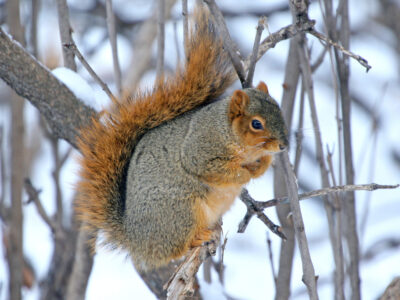If you happen to live in a region where deer are seen frequently, then why not help them and coexist with these wonderful wild creatures with the help of your garden. Readying your garden in a way that deer’s find delightful and worthy of reaching to satisfy their sustenance needs is a way to attract them.
Particularly in winter and fall when food is limited for them to find, it will be a great opportunity for you to get them into your garden. The scenery of a gazing deer up close is something majestic which many people wish to experience not once but again and again.
Is It Okay to Feed Deer in Your Garden?
Before moving further, it is important to answer this question of yours. The answer is yes, it is totally fine to feed a deer, that too in your garden. Since your backyard must have a fence encircling it, do make sure that there is a big opening from which a deer can reach inside effortlessly. Feeding a deer is to help them survive, although do not forget that they are still wild animals and take due care for their and your safety.
Make sure to keep in mind the following tips:
- Never feed them human food, it is not healthy for them at all.
- Do not approach the beasts when they are eating, they may get hostile.
- Be prepared for increasing the food in the fall and winter seasons.
- It is not safe to pet them, they are in your backyard but are still wild.
- Reserve for them a decent amount of space that is unattended.
What to Offer Deers?

Deers are known for eating various buds from trees, shrubs, flowers, grass, twig, weeds, fungi, nuts, and pretty much everything they can find. Their diet varies as per the season, deer are also ruminators, meaning they will eat fast and will later ruminate. In the forest when food is scarce, they usually end up in the city and other places in search of food.
For ease in determining what to feed the deer in backyard, we have got a list and some details.
- Oats – This is the nicest food that you can have the money for and is extremely suitable for the deer’s diet and health.
- Legumes – This may cost a little extra but is worth it since deer can digest them easily, they are likely to eat them. You can get black-eyed peas, soybeans, and purple hulled peas for deer feed.
- Ready-made food mixes – In the market, you can easily get your hands on deer feed that consists of oats, molasses, deer corn, soybeans, vital minerals, and vitamins. Make sure you go through the label and confirm that the food is completely safe for the deer.
- Fruits & Vegetables – Plums, mulberries, grapes, blackberries, apples, cherries, carrots, pears, deer will love this food and will gulp it down quickly. Bananas and watermelon in small proportions can also be given to them.
If that’s not sufficient, plants, trees, herbs, and shrubs in your garden can also comprise a deer’s diet.
What to Plant in Your Garden to Help Deers Co-exist
Herbs & Small Plants
- Alfalfa
- Chives
- Dill
- English Ivy
- Ferns
- Lavender
- Mint
- Strawberry
- Sweet Clover
- Vetch
Trees
- Crab-apple
- Cedar
- Apple
- Dogwood
- Hawthorn
- Oaks
- Poison Ivy
- Willow
Bushes and Shrubs
- Aucuba
- Arborvitae
- Blueberry
- Azalea
- Euonymus
- Holly
- Rhododendron
- Roses
- Tulips
What Not to Feed Them?
Knowing about deer’s favourite food is great, you must also know about the foods that are worst for deer and they should be avoided. Since deer are not smart enough to identify which food is not safe for them and you will be feeding them in your garden, that is why due supervision is required. Again, we have prepared a list of food that you should not feed the deer.
- Corn – Corn is dangerous for deer’s, even though their digestive system is quite powerful. The high content of starch and carb is not healthy for a deer’s digestive system and must be prevented.
- Acidic Fruits or Vegetables – Deer cannot properly digest vegetables such as tomatoes, garlic, onion, etc, and fruits like lemon, grapefruit, oranges, etc.
- Artificial Foods – Avoid feeding them fancy foods that we eat such as bread, cake, cookies, sugary drinks, candy, and anything high in yeast and artificially sweetened.
How To Attract Them?

Deer only need to discover food to wander in that place, but just in case you want to make sure that they do give a visit to your garden and appreciate the food, follow our tips.
- Keep yourself and your pets off the area.
- Grow plants, shrubs, and trees that are liked by deer, we mentioned them earlier.
- Use deer lures surrounding the garden, but make sure that lure does not fall on your body. Deers do avoid areas with human scents.
- Let your grass be taller than usual, deer’s love that.
- If possible, create a water source for them in your garden.
- You can also use salt and mineral blocks; deer are highly attracted to them.
Some More Tips
- Protect the young plants until they become a decent source of food, as deer will not be hesitant to eat it.
- Make sure feeding deer is legal in your city and state.
- Inform your neighbours about your plans of feeding the deer, so they may restrict their pets from closing in, especially if they have dogs.
- Be prepared and do not mind some property damage done by deer, as they are aggressive animals.
- Before starting, make sure you have the budget to feed them because they will rely on you once you start feeding them.
- Expect multiple deer visits in your garden.
Final Thoughts
It is worth watching these lovely deer feeding in your garden, you are not only helping them, but you are also developing a coexistence between humans and wildlife.
In the beginning, it might be a little tough to feed them in your garden but as time passes by, they will eventually visit your backyard regularly. Just follow the tips mentioned above and notice the happiness the deer will bring into your life.














Comments